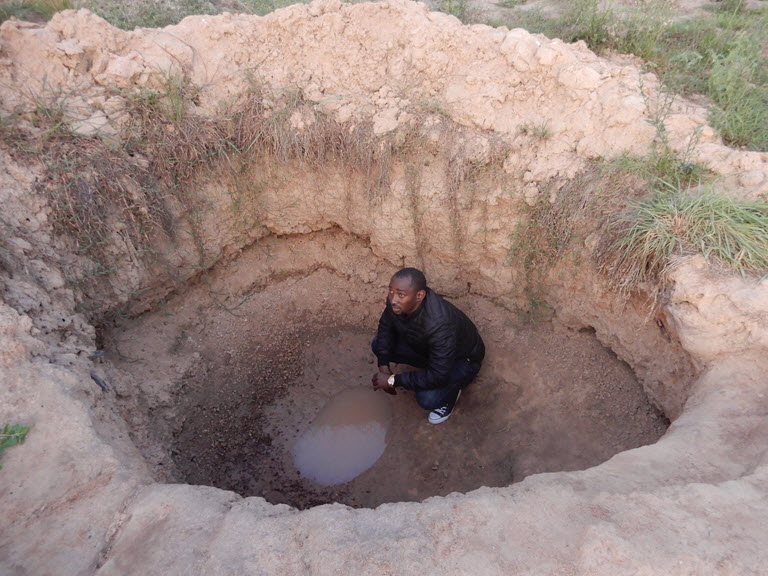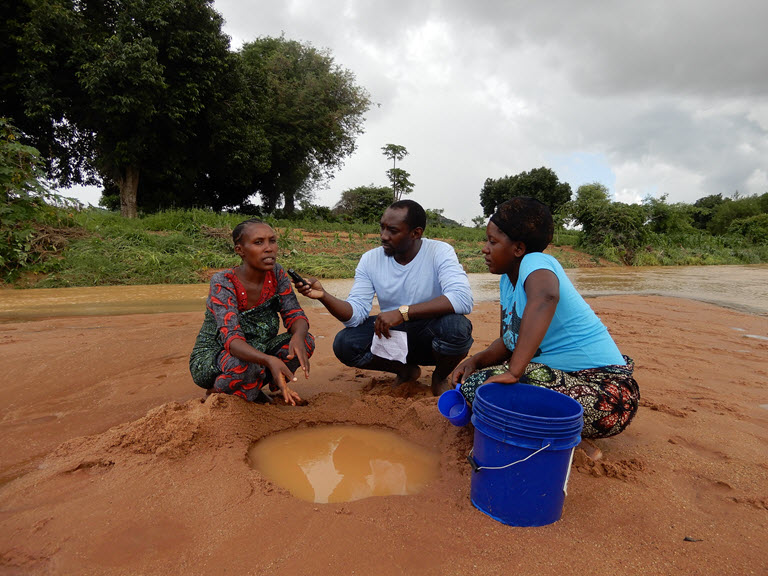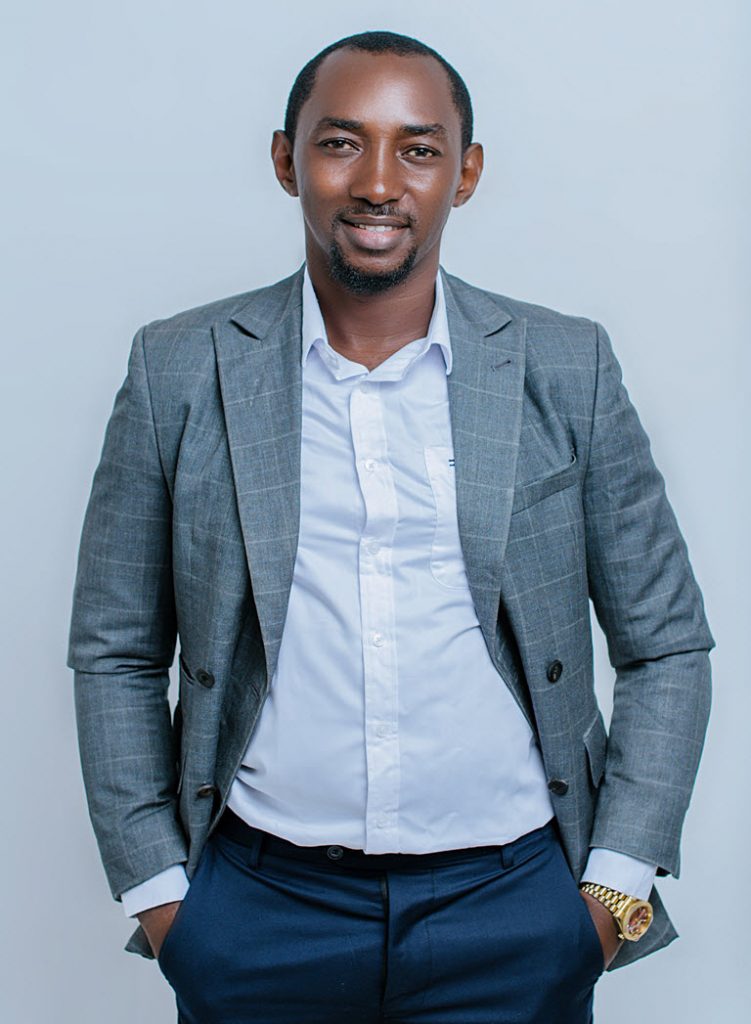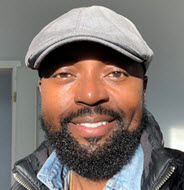Mohammed Hammie is not your typical reporter. In 2019, the young Tanzanian swapped from being a regular journalist to media for community empowerment. He has since specialised in telling stories about the human right to access clean drinking water, particularly in rural areas. In an interview with the EAST site’s Chrispin Mwakideu during the EAST storytelling festival, he opened up on his journey and future plans, in this inspiring story.
What led you to focus on reporting stories about the right to clean water and sanitation?
Having worked for ten years as a journalist, I found there was a lack of reporting on water and sanitation issues, especially for the rural community. I saw it as a forgotten community, and it was only through amplifying their voices that I could help them. So I started travelling to rural areas to identify those challenges and then produce radio programs that community radios broadcasted in Tanzania.
When did you begin working as a community empowerment journalist?
I did not realise the power of journalism until I transformed from a regular journalist to a reporter dedicated to community development and transformational change.
My movement began in 2019 after establishing my radio program Sauti Yangu, which means ‘My Voice’ in Swahili. https://www.endwaterpoverty.org/blog/airing-concerns-how-radio-raises-community-voices-tanzania.
Sauti Yangu is a 30 minute unique and powerful show that aims to engage citizens, amplify their voices and pressure the government to resolve the water crisis in rural areas. To produce the programs that reflect people’s experience, I meet community members who often have to travel long distances to fetch water from wells, ponds, or springs. In addition, I conduct interviews with them to explore the reality of their lives.

For balance, I talk to village elders (often the village chairperson or village executive officer) to understand what actions are currently being taken at the village level to resolve the water crisis and what they will do to prevent a future problem.
What impact has your radio show achieved at the community and national level?
Since Sauti Yangu started in 2019, I have successfully aired two programs on the community radio stations, Planet FM in the Morogoro region and Voice of Africa in the Tanga region. Both programs made an impact after the government initiated major water projects to solve citizens’ water problems.
My radio program produced at Mswaha village led the Tanzania government to pledge $500 million to address the rural water crisis after airing villagers’ concerns. https://www.endwaterpoverty.org/tanzania-government-pledges-500-million-to-address-rural-water-crisis-media-for-community-empowerment.
Another radio program produced at Lukobe village led the government of Tanzania to initiate a major water project at Mkundi. The project has cost the Tanzanian government 620 million Tanzanian shillings and will benefit 45,000 households. Other villages that benefited from the project are Mkundi, Mguru wa Ndege, Lukobe, Makunganya, and Kihonda Kaskazini. https://www.youtube.com/watch?v=puMNgiCAiLo&t=13s.
In 2020 I joined forces with End Water Poverty (EWP), a global civil society coalition, campaigning to end the water and sanitation crisis through their #ClaimYourWaterRights campaign. This global mobilisation campaign aims to spur people to claim their human rights to safe water and sanitation.
Can you give a practical example of how your show changed a community?
Seven months after airing a radio show at Kikwawila village in Ifakara, Tanzania, the local government managed to drill water for their citizens. The village chairperson said they had successfully dug a well after allocating village government funds, following a discussion at the village assembly. Three days after the radio show aired, he said that village residents started bothering him by asking when the local government would dig a well. They realised that water is their human right after listening to the radio broadcast. The program aired on Pambazuko FM, Morogoro. https://www.endwaterpoverty.org/realising/-rural-community-water-rights-Tanzania
What are some of the challenging experiences you have encountered in your work?
The biggest challenge in my work is reaching the people who face water challenges. In urban areas, one can buy bottled water, but people depend on water from wells in rural areas. To reach these people, I have to get to where they live, so I have to travel on rough roads, pass through forests, and ride motorcycles from one village to another as there is no reliable transport there.
Another challenge is the authorities doubting the authenticity of the water story I produce from the people living in the villages. The model of my radio program is to show the water challenges. I believe that the solution to the water challenge is for citizens to get water and not receive their leaders’ promises.
What do people think of your journalism specialisation?
The important thing is not just acquiring journalism skills but also how you use the skills and how the skills help your community.
I get a lot of compliments for the way I use my profession to help the community. People see me as a hero. They see me as a bridge to pass their voices to their leaders.
I am very grateful to the Tanzanian government for being responsive. When I go to every village and introduce myself, I am well received. The Village Chairman and the Village Executive Officers are happy to take me to areas with water challenges. They introduce me to their citizens for a discussion and then find a sustainable solution.

Also, the various organisations helping the community get water give me support in making my work successful. There is the cost of travelling to rural areas, staying there for more than a week, producing programs and also the cost of airing such programs on community radios. Alone I could not do it.
What are your future plans?
I want to establish a radio station and call it Water FM. The station will be feature stories about water challenges, water success, the use of water, impacts from wastewater use, water resources management, water policy, government and UN strategies on water, global goals on water, economic and social development from water, climate change and the environment.
Also, this year, 2021, I will release my book called Mandiga’s well. An educational and inspirational story that gives women the knowledge and confidence to claim their rights on water.

My knowledge and experiences on water provided me with a need to write a book on water challenges in Tanzania so that women and citizens can know their water rights.
My journey has just started! I aim to reach all of Tanzania. Every region, every district, every ward, and every village.
 Chrispin Mwakideu
Chrispin MwakideuReport by Aga Khan University’s Media Innovation Centre analyses the country’s millennials and digital natives’ media consumption habits.
For the media to flourish, and the society to have free flow of accurate and verifiable information, journalists, the drivers in the passing of information are expected to be well grounded in laws and the legal aspect pertaining to the job, writes Alfred Ganzo.
Pitching provides numerous opportunities for your new or existing business ideas to be discovered and realized; and as Simon Mtabazi writes, some startups have become billion-dollar companies due to efffevie pitches
The success you achieve with your media startup business will heavily rely on your reputation as a trustworthy company, and as Nandi Mwiyombella writes, it will also open a new window for customers and potential investors.
That’s why I think today is such a great space for us to sit back and reflect on the questions that could help us shape the kind of journalism that we want to see in our local and global community.
The report specifically analysed eight major variables which include: newsroom structure and resources, media ownership and business models, organisational capacity, innovation culture, journalism culture, financial trends and results, content quality and COVID-19.
Mudi, in her role as Media Council of Kenya regional coordinator in charge of Mombasa(covering the entire coastal region), has found herself at the forefront in advocating and fighting to protect journalists’ rights, culminating in her being awarded for her peace efforts in the run-up and during the 2022 general elections in Kenya.
The 2022 general elections have been mentally draining for journalists, some of whom have had to stay on the campaign trail for over a year. Others have had to toy with the tough call of managing teams in the newsroom. East Site’s Isaac Swila and political writer Rawlings Otieno recount their experiences
What role did social media influencers play in the election? What voice did they give in political discourses during and around the election period? And to what extent did political candidates involve the influencers in marketing their manifestos to sway votes in their favour? East Site writer Steven Omondi unpacks the details
The media industry is experiencing enormous transformation as new digital trends emerge. With the vast opportunities that the digital space offers, media owners and content producers must deliberately adapt to how the audience consumes content.
With the increased Digital Technology at the palm of just anybody; there are a lot of information that distort whether deliberately or not highlighting the need of robust Fact0checking as Asha D. Abinallah explains
Is there a danger in media personalities having a vibrant social media presence? Assuming they have a massive media following, should they self-regulate and filter what they post? And when they engage with followers, should their opinions be taken as personal, or does it represent the journalist’s media house? East Site writer Isaac Swila explores
Media stakeholders are raising concerns over the lack of gender-inclusive reporting in East African newsrooms. They want concerted efforts to ensure more female journalists get equal opportunities like their male counterparts.
The partnership will also ensure that local content is curated and distributed to better optimize the product and meet the needs of Kenyan online users.
The news industry is constantly changing, and in the last few years, User Generated Content (UGC) has become a ubiquitous feature in news sourcing and packaging. However, media houses and journalists need to establish verification and credibility safeguards to avoid the misinformation trap.
Reporting on elections is, for many journalists, an opportunity to establish themselves as reliable political reporters. But the task comes with certain risks, particularly in the East African sub-region.
Stakeholders are now calling for concerted efforts, better planning and preparations for journalists before they are sent out on the field to cover Kenya’s high-stakes August 9 General Elections.
East Africa’s media grapples with a myriad of challenges whenever general elections approach. Not only do editors struggle with balancing the competing political interests, at times at the altar of professionalism, but individual journalists pay dearly, many suffering attacks in the course of their duties.
As Form One students settle into a new life in secondary school, this has also been a period of reflection. We have read tear-jerking and heart-warming stories of determined students who overcame many odds to get an education and how well-wishers came together in their aid.
There is renewed optimism in the Tanzanian media space following the ascension to power of President Samia Suluhu whose regime is keen to relax some of the laws deemed punitive to journalists and media houses
Uganda fell behind, whereas Kenya improved its press freedom ranking in the Reporters Without Borders 2022 Press Freedom Index. And after years of media freedom decline, Tanzania appears to be on the right track. But overall, media freedom activists say there is still work to be done.
A free and independent press is the cornerstone of any democracy and the foundation of economic success, mostly because through our free press, we’re able to hold the leadership to account.
To align with the changing times and stay relevant in the business, media houses are challenged to rethink their strategy and to adopt and understand obstacles and challenges they face towards rethinking and exploring alternative sources of revenue and on developing the digital strategy.
A team of young, Tanzanian tech-savvy communication professionals is dreaming big. It seeks to usher a new dawn in media business management in Tanzania by optimising employee output and offering consultancy to media businesses on how they can operate with a minimal budget but still attain their goals.
Bloggers and influencers have become an integral component of information sourcing across East Africa. The public uses blogs, privately run websites and social networks to crowdsource information from social networks, which they then publish and distribute. But it’s not all rosy for this group of content makers.
The chances of meeting a medical graduate practising journalism are usually very slim, especially in Sub-Saharan Africa. But two Tanzanian physicians have broken away from that norm by inventing a start-up called Afyatoon. It uses visual art technology to tell compelling medical stories. They narrate to the EAST Site their experience and share their vision for the future.
Did you know that in 2021 Kenyans watched less TV and spent more time on social media? Or that some Kenyans rely on family, friends, or even social media icons and bloggers as a source of news and information? These are some of the conclusions highlighted in the 2021 State of the Media Survey conducted by the Media Council of Kenya (MCK).
The effects of the Covid pandemic continue to change the world in ways we had not imagined possible. The media is going through a painful transformation to keep up with changing production, distribution and consumption habits. In East Africa, Uganda’s Media Challenge Initiative (MCI) recently hosted a panel discussion on Media Viability comprising experienced journalists from Television, Radio, Print and Online/Digital media to address lessons learned from the pandemic. East Site’s Moses Mutente attended the panel and compiled this article.
In this commentary, Uganda-based journalist Caleb Okereke shares deep personal insights into why media schools in East Africa must rethink their curriculum. He stresses the need for trainers to begin teaching media ownership to better equip journalism students for the dynamic and cutthroat job market by taking us through his journey as a journalism student and media owner.
For the second year running, a survey commissioned by the Media Council of Kenya shows that the trust level in Kenyan media has nosedived, raising fundamental questions on how media will play its watchdog role more so with landmark elections set for August 9. EAST Site writer Isaac Swila explores.